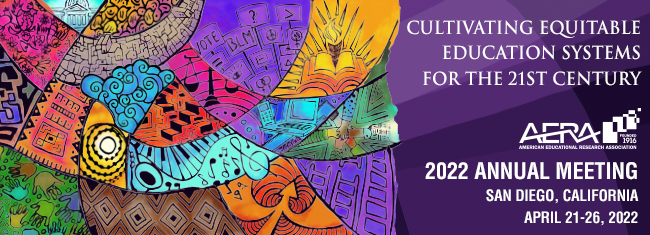MCL researchers, Andria Agesilaou and Dr. Eleni A. Kyza will be participating in a symposium presentation at AERA 2022 (April 21 to 26). Their contribution is titled “Fostering awareness of big data through a quantified-self approach: Designing for critical data literacy” and it will be part of the symposium “Data Literacy in Context: Culturally Oriented and Place-Based Learning through Data”. The symposium was submitted to Division C – Learning and Instruction/Division C – Section 3a: Learning Environments and will take place on April 21.
Symposium abstract
This symposium responds to calls for increased focus on data literacy in education and specifically how context, culture, and place impact what and how people learn through data. The 11 studies aim to highlight: 1) Real-world issues that are investigated through data; 2) How place-based learning is enabled (e.g., what technologies and resources are used); 3) How identity, historical narratives, and local or cultural knowledge are engaged; and 4) Methods, analyses, and evaluation of learning and/or participation. This set of studies highlight the ubiquity of data literacy goals for a range of learners (e.g., youth to adults), a range of disciplinary applications (e.g., art to bioinformatics), and a range of contexts (e.g., rural to urban).
Chairs
Susan A. Yoon & Katherine M. Miller, University of Pennsylvania
Discussant
Andee Rubin, TERC
Contributions
- Place-Based Air Quality Inquiry in U.S. Rural Contexts
Joseph L. Polman, Trang Chau Tran, Daniel W. Knight,
University of Colorado Boulder - Hyperlocal Expertise: Schoolyards as Rich and Complex Contexts for Developing Children’s Data Practices
Kathryn Lanouette, College of William and Mary
Victor R. Lee, Stanford University - Learning Bioinformatics Through a Justice-Centered Design: Developing Student Relationships With Data in Urban Communities
Susan A. Yoon, Jooeun Shim, Katherine Miller, Amanda Cottone, Noora Fatima Noushad, Thomas Richman, Amin Marei, Blanca Himes, Ryan Urbanowicz, University of Pennsylvania
Michael Gonzalez, Children’s Hospital of Philadelphia - Seeing ourselves in the data: Situating data literacy in theory building and action-taking by youth
Bodong Chen, University of Minnesota
Leanne Ma, Ben Peebles, University of Toronto - A framework for exploring self, community, histories, and futures through data
Michelle Hoda Wilkerson, Meg Elena Escudé, Edward Rivero, Kris D. Gutiérrez, University of California, Berkeley
David J. Stokes, Hollylynne Stohl Lee, North Carolina State University
Emily V. Reigh, Stanford University - No learning lost here: Youth critical data practices in the COVID-19 multi-pandemic
Angela Calabrese Barton, Day W. Greenberg, Chandler Turner, Devon Riter, Leslie R. Herrenkohl, Elizabeth A. Davis, Tammy Quinn Tasker
University of Michigan - The role of data literacy in convergence and divergence of reasoning criteria between social groups
Ilana Dubovi, Tel Aviv University
Iris Tabak, Ben-Gurion University of the Negev - Cultivating identities of care in the science classroom using complex systems data and modeling
Veronica Cassone McGowan, University of Washington Bothell
Philip L. Bell, University of Washington - Place-making practices with COVID-19 data
Joshua L. Radinsky, University of Illinois-Chicago
Iris Tabak, Ben-Gurion University of the Negev - Postcards from the Bronx: Students redefine what a healthy place is through justice-oriented data art
Anna Amato, Camillia Matuk, Kayla DesPortes, Marian Tes, Ralph Vacca, New York University
Veena Vasudevan, University of Pittsburgh
Megan Silander, Educational Development Center
Peter J. Woods, Massachusetts Institute of Technology - Fostering Awareness of Big Data Through a Quantified-Self Approach: Designing for Critical Data Literacy
Andria Agesilaou, Eleni A. Kyza, Cyprus University of Technology



